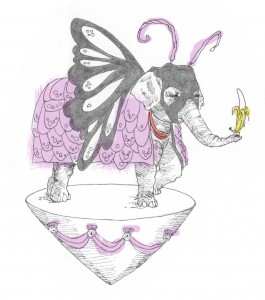The fire alarm shrills, pulls me awake. The clock radio blinks 2:37. Natasha moans in her sleep, but I’m too keyed up to sleep, dreaming of our new life.
“Natasha,” I shake her, “we have to get out. It might be real.” She turns away, buries her head. It’s the third consecutive night of ringing. Last night Mr. Jayaraman took ten minutes to turn it off, while the tenants of his five flats shivered in bathrobes and slippers on the sidewalk. At the end of the ruckus Mr. Jayaraman, wearing a nightshirt and a hat with a pom-pom at the end, waved us in, smiled and said, “Has the stormy weather set the whole sea in motion? No worries, my friends, electrical no doubt. I fix it.”
I shake Natasha again. She sits up, swats my arm. “Don’t touch me, Franti, don’t touch me again. You go outside, wait for your guru to turn the alarm off. I’ll stay and burn to a crisp in my bed.”
I pull at her blanket as the alarm goes silent. She burrows; I put my head on my pillow, sink my consciousness far from the chill of Toronto into the waves of the Indian Ocean.
When I wake up, she is sitting on the couch staring at a yawning suitcase half-filled with folded blouses, a lacy black bra and a red thong on top. She does not turn her head but speaks in a half-whisper. “I’m not going with you. I don’t belong with elephants and banana leaves.”
“Natasha, richer or poorer, from this day until death do us part.”
She slurps her coffee. “First Tamil proverbs from Mr. Jayaraman and now it’s vow recitations? OK, what about the dance at the wedding? Remember The Beach Boys? Remember “fun, fun, fun till daddy takes her T-bird away”? You’re not taking my T-bird away. You fly off, expand your mind in Sri Lanka, teach those kids English. Me, I’m staying. I’ll buy red stilettos today.” The suitcase crashes; her clothes spill out. She does not look back before she slams the door.
She still has not returned in the late afternoon. The glossy brochure on the kitchen counter is covered with rice flour. The music of Ramanathan keeps me centered as I recite lists of Tamil vocabulary. I wash potatoes, mix rice flour, chili powder, garlic paste and fry the potato bajji the way Mr. Jayaraman’s wife used to, as he weaves Tamil tales and stories of his wife and family in Colombo. I admit Natasha stormed out. “A family divided against itself will perish together,” he says, biting into the first bajji. “But sometimes it is good to taste loneliness. The husband that ran away has returned and is reconciled; therefore, she has adorned herself with jewels to excess. You must do what is right. Teaching is noble. When you return, a good woman will rejoice to have you back.”
He leaves after eleven, after many cups of tea. Twelve days till we fly. I am drifting off with a dictionary and Tamil phrases in bed when Natasha stumbles in, smelling of beer and cigarettes. I don’t ask where she’s been. She does not speak. Through the open bathroom door I watch her spitting out pink toothpaste, its trickle down her chin. I long to touch her.
“I’ll sleep on the couch,” she says.
“Natasha, I can…” Her look freezes other words. She pulls a packet of cigarillos out of her purse, lights one, blows smoke towards me. I cough.
There’ll be no screeching of fire alarms in the wee hours tonight, I want to say. Mr. Jayaraman told me he’d disconnected them. But in the thundering silence between us it does not seem important.
“Is it safe?” I had asked.
“To the timid the sky is full of demons. We all sleep better tonight.” I straighten my sheet, turn to the wall. In the living room I hear coins spilling, a giggle, then a snore.
No sleep for me, I am sure, as I toss, alone. But I do dream after all of soaring above a Sri Lankan countryside, children and women singing, breaking twigs, feeding a bonfire. I wake with a pounding head; I smell smoke, vomit. “Natasha? Natasha?” Light switch flip does nothing. I run into the living room. The couch is empty. Did I dream her? I scurry from room to room, even open a closet, searching. I hear screams outside our apartment door, wailing. Sirens blare as I run outside. “Have you seen my wife?” I yell at Mr. Jayaraman on the sidewalk.
“She was carrying a suitcase, heading that way,” he points with his head. “Only one shoe on.” I look. The street is empty.
Mr. Jayaraman is at the airport to see me off. “If only I could fly, too,” he says, shivering in the air-conditioning. “You are the blessed one but I have my house to look after, the fire investigation. He who takes care of his property will not be robbed. Observe with young eyes, make note of everything. Teach them the language of Shakespeare and Milton, come back in a year, like seasonable rain.”
Neither of us mentions Natasha. When I ride on top of that elephant in Colombo, I expect she will streak by in her T-bird, hair shimmering in the wind.
Andrew Stancek was born in Bratislava and saw Russian tanks occupying his homeland. His dreams of circuses and ice cream, flying and lion-taming, miracle and romance have appeared recently in Tin House online, Flash Fiction Chronicles, The Linnet’s Wings, Connotation Press, THIS Literary Magazine, Thunderclap Magazine, Istanbul Literary Review and Pure Slush.
Read an interview with Andrew here.


Beautiful story, Andrew! Love that Natasha!
Pingback: Interview with Allen Forrest, Illustrator | Rkvry Quarterly Literary Journal
Pingback: Interview with Dan Jacoby | Rkvry Quarterly Literary Journal